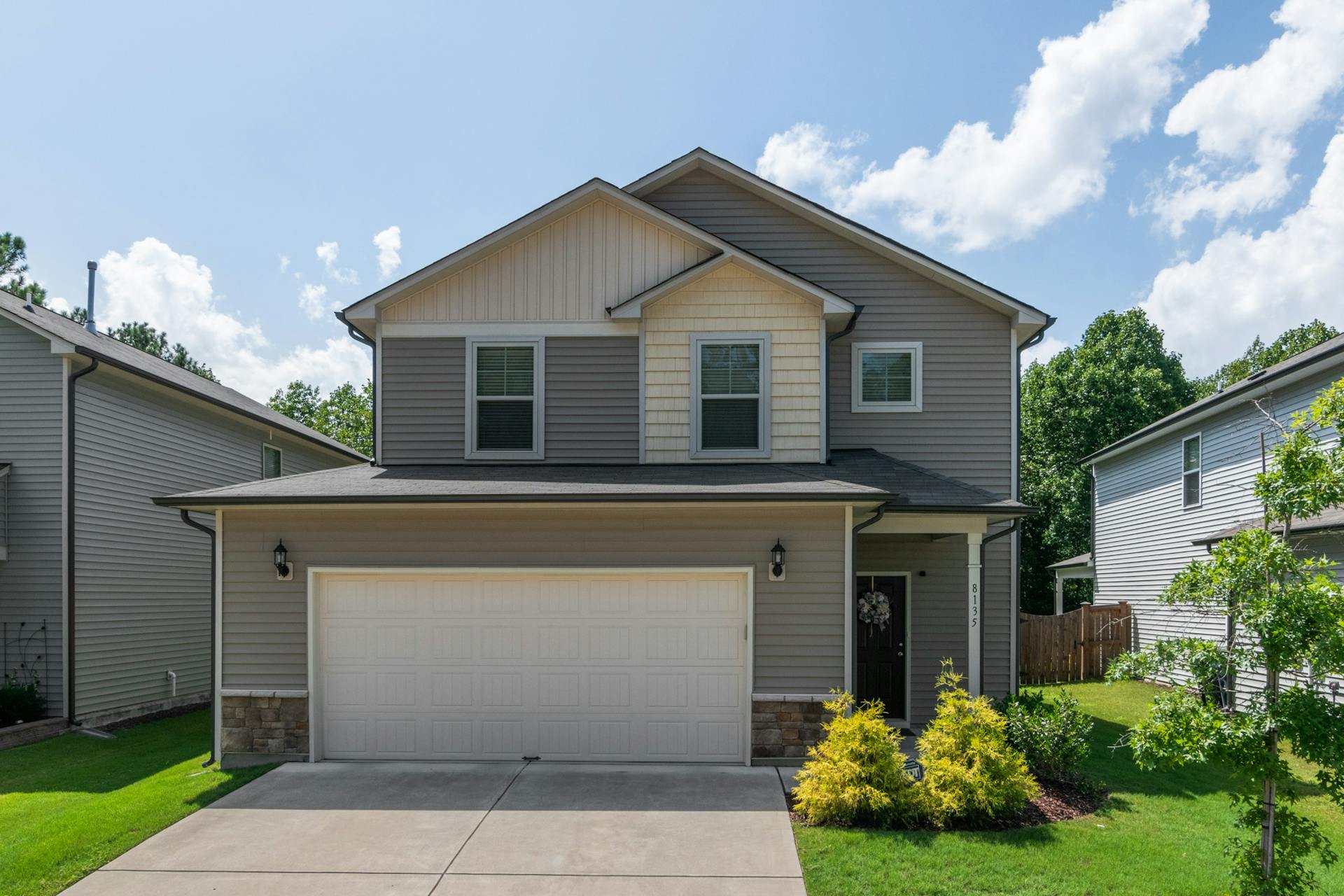
To apply for a reverse mortgage, you'll need to meet the eligibility criteria, which includes being at least 62 years old, owning your home outright or having a low balance on your mortgage, and occupying the property as your primary residence.
You'll also need to consider the types of reverse mortgages available, such as the Home Equity Conversion Mortgage (HECM) and the proprietary reverse mortgage. The HECM is insured by the Federal Housing Administration (FHA) and is the most common type of reverse mortgage.
The application process typically begins with a counseling session with a qualified counselor who will explain the process and answer any questions you may have. The counselor will also provide you with information about the costs and risks associated with a reverse mortgage.
The lender will then review your creditworthiness and the value of your home to determine how much you're eligible to borrow.
For another approach, see: How Does a Hecm for Purchase Work
Qualification Requirements
To qualify for a reverse mortgage, you'll need to meet certain requirements. You must be at least 62 years old, and the youngest borrower on title must meet this age requirement.
The home you're applying for must have sufficient equity, which is determined by an FHA calculation that takes into account the current interest rate, whether the rate is variable or fixed, the age of the youngest homeowner, FHA lending limits, and the appraised value of the home.
You'll also need to have a sufficient income to cover property taxes and insurance, and you may need to set aside additional funds from loan proceeds to pay for these expenses.
Eligibility requirements vary by lender, but you'll typically need to own the property or have an existing mortgage balance that's low enough to be extinguished by the reverse mortgage proceeds.
Here are the key factors that lenders consider when determining your eligibility:
- Age: You must be at least 62 years old, and the youngest borrower on title must meet this age requirement.
- Home value: Your home must have sufficient equity, which is determined by an FHA calculation.
- Income: You'll need to have a sufficient income to cover property taxes and insurance.
- Debt: You may need to have a low or no existing mortgage balance to qualify for a reverse mortgage.
In Australia, the eligibility requirements are similar, but you must be over a certain age, usually 60 or 65, and own the property or have a low enough existing mortgage balance to qualify for a reverse mortgage.
Understanding the Process
Before applying for a reverse mortgage, it's a good idea to meet with a specialist to research and understand the process. This can take around one to two months.
The initial application is a crucial step, but it's not binding and can be canceled at any point. The application will specify the reverse mortgage fees, interest rates, and loan amounts.
It's essential to note that the lender cannot incur any costs on your behalf until counseling is completed, which is the next step in the process.
Curious to learn more? Check out: Loan Application Process for Mortgage
Process
Before you start the reverse mortgage process, you'll likely meet with a specialist to discuss your options and research the process. This can take around one to two months.
The application process begins with an initial meeting with a specialist. The homeowner typically researches reverse mortgages using resources from a local reverse mortgage specialist.
You'll need to meet with the specialist in person to review the good faith estimate and other loan documents. This is a crucial step in understanding the terms of the loan.
The application legally authorizes the lender to begin the process, but the lender cannot incur any costs on your behalf until counseling is completed. This is an important protection for homeowners.
The application is not binding and can be canceled at any point during the process. This means you can change your mind or decide not to proceed with the loan.
The application will specify the reverse mortgage fees, interest rates, and loan amounts. It's essential to carefully review this information to understand the terms of the loan.
Discover more: What Not to Do When Applying for a Mortgage?
Appraisal Basics
An appraisal is required to determine your home's value, and for a reverse mortgage, it's conducted by an FHA-approved appraiser following specific FHA guidelines.
The appraisal process has changed to introduce Appraisal Management Companies (AMCs) that handle coordinating and communication between appraisers and homeowners.
A complete FHA appraisal is required to obtain a reverse mortgage, and in some instances, a second appraisal can be required at HUD's discretion.
Curious to learn more? Check out: Reverse Mortgage Appraisal
If two appraisals are required, the lower of the two values will be used for the reverse mortgage calculations.
Proprietary reverse mortgages that value at or above $2 million may also require two appraisals.
Appraisals must adhere to Federal Appraiser Independence guidelines, which state that the appraiser cannot be selected by the homeowner or broker/lender.
The appraiser will deliver the appraisal to the homeowner and the reverse mortgage broker or lender, showing all the data used to determine the home's value.
Here are some common costs associated with an appraisal:
- Other Closing Costs
- Counseling
- Wire Fee
- Flood Cert
- Credit Report
The cost of the appraisal can vary, so it's essential to factor it into your overall reverse mortgage costs.
Loan Details
Loan size can be as high as 50% of the property's value, determined by factors like age, current interest rates, property value, location, and program minimum and maximum.
The exact amount of money available is calculated based on these factors, with a higher amount available at a higher age.
A unique perspective: What Percentage of Home Value for Reverse Mortgage
Typical costs for the reverse mortgage include an application fee, which can range from $0 to $950, and stamp duty, mortgage registration fees, and other government charges that vary with location.
A monthly service charge may be applied to the balance of the loan, compounding with the principal, but the best products have no monthly fees.
Here are some examples of principal limits for various ages and expected interest rates, based on a property value of $250,000:
Loans
In Australia, reverse mortgages can be as high as 50% of the property's value. The exact amount of money available (loan size) is determined by several factors, including the borrower's age, current interest rates, property value, and property location.
The cost of getting a reverse mortgage depends on the particular reverse mortgage program the borrower acquires. These costs are frequently rolled into the loan itself and therefore compound with the principal. Typical costs for the reverse mortgage include an application fee (establishment fee) that can range from $0 to $950, and stamp duty, mortgage registration fees, and other government charges that vary with location.
The interest rate on the reverse mortgage varies, with some programs offering fixed rate loans and others offering variable rate loans. Since the update of the National Consumer Credit Protection Act in September 2012, new reverse mortgage loans are not allowed to have fixed rates.
In the US, the maximum loan limit for a HECM reverse mortgage is $1,209,750 in 2025. However, the amount you can actually borrow depends on your principal limit factor (PLF), which is set by HUD and based on the current interest rate and your age.
A borrower's PLF can range from 0.301 to 0.625, with 0.301 being the lowest and 0.625 being the highest. For example, a 62-year-old borrower with a 7.25 percent mortgage rate has a PLF of 0.301, which means they can access around 30.1% of their home's value.
Here are some examples of principal limits for various ages and expected interest rates:
Loan Due Date

Loan Due Date can be a stressful aspect of loan repayment, but understanding the basics can help you stay on track.
The loan due date is typically the day of the month when your loan payment is due, and it's usually the same day every month.
Most loans have a 15-day grace period, during which you can make your payment without incurring late fees.
Consider reading: Mortgage Payment
HeCM for Purchase
The HECM for Purchase program allows homeowners to purchase a new principal residence with HECM loan proceeds. This program was effective January 2009 and was designed to eliminate the need for a second closing.
Texas was the last state to allow for reverse mortgages for purchase. The HECM for Purchase program requires homeowners to pay property taxes and homeowners insurance on their own, which is a requirement of the HECM program.
Unlike traditional forward mortgages, there are no escrow accounts in the reverse mortgage world. Homeowners must pay property taxes and homeowners insurance directly.
If a borrower fails to meet satisfactory credit or residual income standards, the lender may require a Life Expectancy Set Aside, or LESA. A LESA carves out a portion of the reverse mortgage benefit amount for the payment of property taxes and insurance.
Readers also liked: Commercial Mortgages Rates
Appraisal
An appraisal is required to determine your home's value, and a reverse mortgage appraisal is conducted by an FHA-approved appraiser following specific FHA guidelines.
The cost of the appraisal can vary, but it's an essential step in the process. The appraisal will determine the property's eligibility and estimated worth to calculate the available size of a reverse mortgage loan.
A complete FHA appraisal is required to obtain a reverse mortgage, and in some cases, a 2nd appraisal may be required as well. If two appraisals are required, the lower of the two values will be used for the reverse mortgage calculations.
The appraisal process has changed in recent years to introduce Appraisal Management Companies (AMCs) that handle coordinating and communication between appraisers and homeowners.
Here are some additional costs associated with the appraisal process:
- Other Closing Costs
- Counseling
- Wire Fee
- Flood Cert
- Credit Report
Federal Appraiser Independence guidelines must be adhered to, stipulating that neither the homeowner nor the broker or lender can select the appraiser who appraises the home. It must be performed by an independently selected qualified appraiser.
Home Finance
Researching a reverse mortgage can be a lengthy process, taking one to two months of meeting with a specialist and reviewing loan documents.
Before applying for a reverse mortgage, it's common for homeowners to research and consult with a local specialist.
A fixed rate for a reverse mortgage can offer predictability in estimating interest accrual, but it requires taking all funds as a lump sum.
Variable rate reverse mortgages have an underlying index and margin rate, which can change in tandem with the benchmark rate.
In some cases, a variable rate reverse mortgage may be more suitable for homeowners who want installment payments, but calculating interest accrual can be more challenging.
Options for Distribution
So you're considering a reverse mortgage, and you're wondering how the money can be distributed. The good news is that you have options, and the right choice will depend on your financial needs and goals.
You can receive a lump sum in cash at settlement, which can be a great option if you need a large sum of money upfront. Or, you can opt for monthly payments, which can provide a regular source of income.
A line of credit is another option, which can be similar to a home equity line of credit. This means that you can borrow money as needed, and the unused amount will grow over time at a compounding rate.
The adjustable-rate HECM offers all four payment options, but the fixed-rate HECM only offers lump sum. This means that if you opt for a fixed-rate HECM, you won't have the flexibility to choose between different payment options.
If you opt for a line of credit, you should know that it will grow faster if the interest rate on the loan increases. This means that you can potentially gain access to more cash over time than what you initially qualified for at origination.
Here are the four ways to distribute proceeds from a reverse mortgage:
- Lump sum in cash at settlement
- Monthly payment (loan advance) for a set number of years (term) or life (tenure)
- Line of credit (similar to a home equity line of credit)
- Some combination of the above
It's worth noting that the line of credit growth rate is determined by adding 1.25% to the initial interest rate (IIR). This means that the line of credit will grow faster if the interest rate on the loan increases.
Origination Fee
The origination fee is what the lender earns on the loan. It's calculated using a formula that takes into account the property's value.
For most properties, the origination fee is 2% of the first $200,000 of the property's value and 1% of the amount over $200,000. This means that if your property is worth $300,000, the origination fee would be 2% of the first $200,000 ($4,000) plus 1% of the remaining $100,000 ($1,000), for a total of $5,000.
A maximum origination fee of $6,000 applies, so you'll never pay more than this amount. And if your home is valued at less than $125,000, you can expect to pay a lower origination fee of up to $2,500.
Here's a breakdown of the origination fee formula:
It's worth noting that these fees are standard across the industry and are built into the loan itself, so you won't need to pay them upfront.
Interest and Rates
Interest and rates can be a bit tricky with reverse mortgages. The interest you pay, along with the annual mortgage insurance premium, accumulates over time and increases the loan balance.
The interest rate on a reverse mortgage is not fixed, but rather adjustable, meaning it can change monthly or annually based on economic conditions. Lenders set a cap to limit rate increases, with a 2 percent annual cap and a 5 percent lifetime cap.
The total interest rate is actually 1.25 percentage points above the quoted rate, due to the FHA's ongoing annual Mortgage Insurance Premium (MIP) charges. For example, if the quoted rate is 4.51%, the total rate would be 5.01%.
Interest
Interest on a reverse mortgage loan accumulates over time, increasing the loan balance instead of paying it down like a traditional mortgage.
The true interest rate is one and a quarter percentage points above the quoted rate due to the FHA's ongoing annual Mortgage Insurance Premium (MIP) charges.
For example, if the quoted rate is 4.51%, the total rate would be 5.01% with the annual MIP charges of .5%.
The Upfront Mortgage Insurance Premium (UFMIP) is based on a percentage of the Max Claim Amount, which is determined by the lesser of your home's value, the current maximum lending limit set by the Federal Housing Administration (FHA), or the purchase price.
If this caught your attention, see: Mortgage Interest Rate
Fixed vs Adjustable Interest Rates
Most HECMs have adjustable interest rates, meaning the rate can change monthly or annually, based on economic conditions.
The rate increase is limited by a "cap" set by lenders, which can be up to 5 percent over the life of the loan.
HECMs have a 2 percent annual cap on rate increases.
The adjustable interest rate includes two components: the actual market interest rate plus a margin added by the lender.
The margin amount is fixed for the life of the loan.
Home Staying Options
If you're struggling to pay your mortgage but want to stay in your home, there are options that give you breathing room during times of financial stress.
You can consider mortgage options that allow you to stay in your home.
These options can give you temporary relief from mortgage payments, such as mortgage forbearance, which allows you to temporarily reduce or suspend payments.
If this caught your attention, see: How to Buy a Home with a Reverse Mortgage
Home Staying Options
If you're struggling to pay your mortgage, there are options that can give you some breathing room during times of financial stress.
For example, if you're struggling to pay your mortgage but want to stay in your home, mortgage options can provide temporary relief.
You can consider mortgage modifications, which can temporarily lower your monthly payments or change the interest rate on your loan.
Mortgage modifications can be a good option if you're experiencing a temporary financial setback, such as a job loss or medical emergency.
Some mortgage modifications can even forgive a portion of your outstanding mortgage balance, giving you a fresh start.
But be aware that mortgage modifications can affect your credit score, so it's essential to carefully review the terms and conditions before signing.
For your interest: Paying off Reverse Mortgage
Home Shopping
If you're looking to stay in a home setting while traveling, you have several options to consider. Many vacation rentals are available for booking, often with amenities like full kitchens and separate living areas.

Some vacation rentals are located in historic buildings, offering a unique and immersive experience. For example, a 19th-century mansion in the countryside can be a great choice for families or large groups.
Renting a home through a platform like Airbnb can be a cost-effective way to stay in a home setting. According to the article, Airbnb rentals can be up to 50% cheaper than hotel rooms.
However, it's essential to research the location and property before booking to ensure it meets your needs. Reading reviews from previous guests can also help you make an informed decision.
You can also consider renting a home through a property management company, which can provide additional support and services. This can be especially helpful if you're traveling with a large group or have specific requirements.
In some cases, renting a home may be more expensive than booking a hotel room. But for longer stays or larger groups, it can be a more cost-effective option.
Suggestion: Rocket Mortgage Mortgage Refinance Cost
Reverse Mortgage Types
Home Equity Conversion Mortgages (HECMs) make up the majority of reverse mortgages, accounting for approximately 95 percent of outstanding reverse mortgage loans.
You or a co-borrower must be at least age 62 to qualify for a HECM, and you're also required to receive counseling from a U.S. Department of Housing and Urban Development (HUD)-certified reverse mortgage counselor.
The counseling session typically costs around $125, which you can pay directly or roll into the loan.
HECMs offer certain protections, most notably that the borrower or their heir will never owe more than the home is worth.
Single-purpose reverse mortgage loans are offered by states or local governments, often designated for paying property taxes or covering home repairs.
Proprietary reverse mortgages have fees and terms that can vary by lender, and may offer higher loan amounts, with some lenders offering loans of over $1 million.
Discover more: Ltv for Commercial Mortgages
Closing and Counseling
The lender can't start incurring costs on your behalf until you've completed the mandatory counseling session with a HUD-approved agency and submitted a signed HECM Counseling Certificate.
This certificate is proof that you've received impartial education about reverse mortgages, and it's required to move forward with the application process.
The counseling can be done before or after the initial application in most states, and you'll receive a list of certified counselors with your reverse mortgage proposal package.
The counseling session itself can be completed over the phone or in-person with a regional agency, and after it's done, the counselor will mail a signed copy of the HECM Counseling Certificate to you.
The cost of counseling is typically $125, but it can vary, and lenders aren't allowed to pay this fee for you.
Counseling
Counseling is a crucial part of the reverse mortgage process.
The lender can't incur any costs on your behalf until you've submitted a signed HECM Counseling Certificate, which proves you've completed the mandatory counseling session with a HUD-approved agency.
You'll receive a list of counselors with your reverse mortgage proposal package, so you can choose one that fits your needs.

Reverse mortgage counseling is a mandatory part of the application process and can be done over the phone or face-to-face with a regional agency.
The counseling session will provide you with impartial education about reverse mortgages, and the counselor will mail a signed copy of the HECM Counseling Certificate to you after the session.
The cost of counseling is typically $125, but it can vary, and lenders aren't permitted to pay this fee for applicants.
You can contact the counseling agency to request a "hardship" approval to pay a reduced fee if needed.
Step 3
Step 3 is a crucial part of the process, where the value of your property is determined. The appraisal must be conducted by an FHA-approved appraiser, not all appraisers have this approval.
The appraisal follows a specific FHA format, which means it's not just a standard appraisal. This is a requirement for a reverse mortgage, and it's different from a regular appraisal.
On a similar theme: Federal Housing Administration Fha Loan

Even if you've had an appraisal before, it's likely that a new one will be required at this stage. The FHA-approved appraiser will assess the value of your property based on the specific format.
This step is essential to establishing the legal value of your property, which is a critical factor in the reverse mortgage process.
Closing
The closing process is a crucial step in the reverse mortgage journey. It's where you'll meet with a notary or attorney to sign the final closing documents.
You'll have a chance to review these documents to ensure everything is in order, including the interest rate, fees, and loan amounts. This is your opportunity to double-check that everything aligns with your expectations.
The closing date will trigger a three-day "right of rescission" period. This means you can still cancel the application with no penalty for three business days after the closing.
After this waiting period, the title company will issue a check to you, if proceeds are available from the reverse mortgage. They'll send this check by overnight mail.
General Information
To qualify for a reverse mortgage, you need to be 62 or older. This is the minimum age requirement for most reverse mortgage programs.
You can choose how to receive your loan proceeds, which can be a monthly payment, a one-time lump sum, a line of credit, or a combination of these options. The loan proceeds are advanced to you based on your home's value and your age.
You're still responsible for paying property taxes, homeowners insurance, HOA dues and assessments, and maintaining the property. If you fail to meet these responsibilities, you may default on your loan, which could result in foreclosure.
Here are some key responsibilities you'll need to meet:
- Paying property-related expenses on time, including property taxes, insurance, and HOA dues.
- Living at the property as your primary residence and certifying occupancy annually.
- Maintaining the property in the same condition as when the reverse mortgage loan was obtained.
Things to Consider Before Buying a Home
Before buying a home, consider how a mortgage could affect your family in the long run. Your spouse may not be able to stay in the home after you die.
It's essential to review the mortgage terms and ensure that there's a "non-recourse" clause, which means you can't owe more than the value of your home when the loan becomes due.
Think carefully about how long you plan to stay in your home, as the costs and fees for some mortgages may be more expensive if you stay for a short time.
What Is?
A reverse mortgage is a loan against your house where the lender pays you, not the other way around. You must be 62 or older to qualify.
You borrow a portion of your home equity, which can be used in various ways, such as monthly payments, a one-time lump sum, or a line of credit. The loan proceeds, plus interest and fees, increase the loan balance over time, reducing your equity in the property.
To qualify for a reverse mortgage, you'll need to be a homeowner aged 62 or older. The loan is typically used to access the value of your home.
You'll receive loan proceeds, but you're still responsible for paying property taxes, homeowners insurance, HOA dues, and assessments. This can be a challenge, especially if you're living on a fixed income.
Here are the responsibilities you'll need to meet to avoid defaulting on your loan:
- Paying property-related expenses on time
- Living at the property as your primary residence and certifying occupancy annually
- Maintaining the property in the same condition as when the loan was obtained
If you fail to meet these responsibilities, you may default on your loan, which could result in foreclosure.
Frequently Asked Questions
What is the downside of a reverse mortgage?
A reverse mortgage can reduce your home equity and limit future borrowing power, resulting in lower profits when selling or reduced loan options. Additionally, high upfront fees are associated with reverse mortgage loans.
How long does it take to get a reverse mortgage approved?
The reverse mortgage application process typically takes 30-45 days from start to finish, but the decision-making process can take longer. Approval times may vary, but understanding the process can help you prepare and make informed decisions.
Sources
- https://www.capitalfundingmtg.com/reverse-mortgage-appliation-process/loan-process
- https://en.wikipedia.org/wiki/Reverse_mortgage
- https://www.aarp.org/money/budgeting-saving/info-2024/reverse-mortgage-guide.html
- https://yourhome.fanniemae.com/own/reverse-mortgage
- https://consumer.ftc.gov/articles/reverse-mortgages
Featured Images: pexels.com


